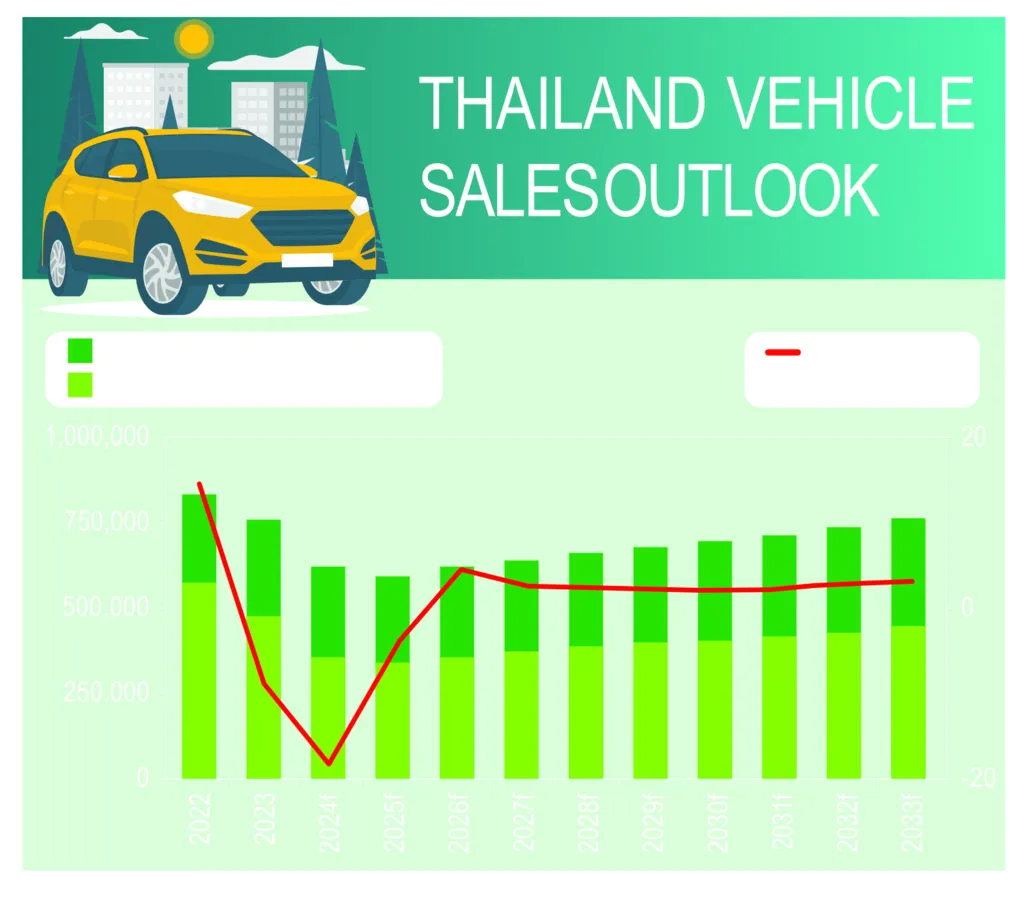These days, Thailand Automotive Industry Trends are undergoing significant changes, driven by shifting market conditions, evolving consumer preferences, and government policies. Despite recent challenges, the sector is poised for future growth, particularly in the electric vehicle (EV) segment. This article explores key trends, sales projections, and the outlook for Thailand’s automotive market. Let's dive deeper into these trends!
Thailand Automotive Industry Trends and Market Challenges

The Thai automotive market is projected to achieve total car sales of 600,000 units in 2025, reflecting a 5% increase from 2024. However, the industry has faced significant headwinds due to economic conditions. In January 2025 alone, vehicle sales plummeted by 12.3% year-over-year, totaling just 48,092 units. This decline is largely attributed to high household debt (currently at 91% of GDP) and stricter auto loan requirements imposed by financial institutions. Banks have tightened lending criteria, with loan approval rates dropping by nearly 15% compared to 2023, further weakening consumer purchasing power.
Production Recovery and Export Growth
Despite the domestic sales slump, Thailand’s vehicle production is expected to grow by 2.1% in 2025, reaching 1.5 million units. A significant portion of these vehicles—approximately 66.66% (1 million units)—is designated for export, reinforcing Thailand’s position as ASEAN’s top auto exporter. Key export markets include Australia, the Middle East, and neighboring ASEAN countries, where demand for Thai-made pickups and eco-cars remains strong.
Major automakers are doubling down on Thailand’s production capabilities. Toyota recently announced a $700 million investment to upgrade its Chachoengsao plant, while Honda plans to shift more hybrid production to its Prachinburi facility. Chinese EV makers like BYD and Great Wall Motor are also expanding local production, leveraging Thailand as an export base for right-hand-drive markets.
Read Also: Thailand Infrastructure Connectivity: A Gateway to ASEAN Growth
The Shift Toward Electric Vehicles (EVs)
One of the most significant trends in the Thai automotive sector is the transition to electric vehicles. By 2030, EVs are expected to account for 31.3% of total automotive sales in Thailand. This shift is largely fueled by increasing consumer interest, environmental awareness, and government incentives aimed at accelerating EV adoption.
Government Policies Supporting EV Growth
The Thai government has taken proactive steps to promote the transition to zero-emission vehicles. Through the 30@30 policy, Thailand aims to ensure that 30% of total vehicle production consists of zero-emission vehicles by 2030. Additionally, financial incentives for manufacturers and consumers are expected to drive further growth in the EV market. These initiatives position Thailand as a key player in Southeast Asia’s shift toward sustainable transportation.
Read Also: Thailand Urbanization Impact: Fueling the Urban Dream
Economic Conditions and Their Impact on the Industry
Despite optimistic projections, the automotive industry continues to face economic headwinds. Slow GDP growth and high levels of household debt have suppressed vehicle demand. Consumers are struggling with tighter lending conditions, making it harder for them to finance new car purchases. This economic uncertainty presents challenges for automakers, forcing them to adjust their strategies to remain competitive in a changing market.
Thailand Automotive Industry Trends: What Lies Ahead?
Thailand’s automotive industry is navigating a complex landscape marked by economic challenges, shifting consumer preferences, and ambitious government policies. While car sales have recently declined, the market is expected to recover, driven by increased production and exports. The rise of EVs, supported by strong government initiatives, has shown the shift in Thailand Automotive Industry Trends, playing a crucial role in shaping the future of the sector. With continued investment and strategic adaptation, Thailand remains a key hub for automotive growth in the region.







